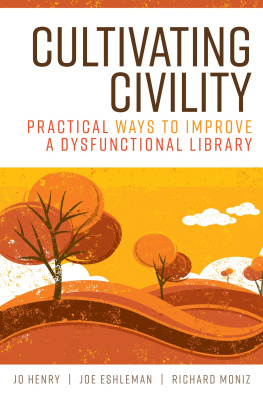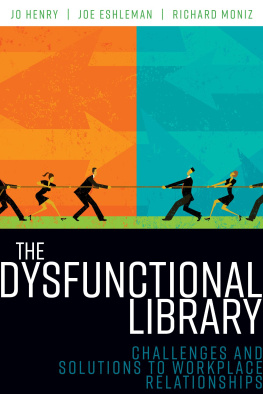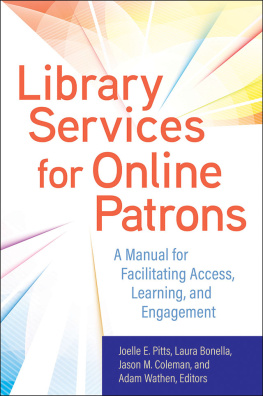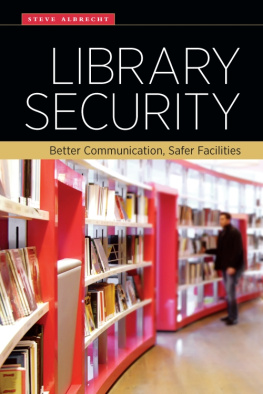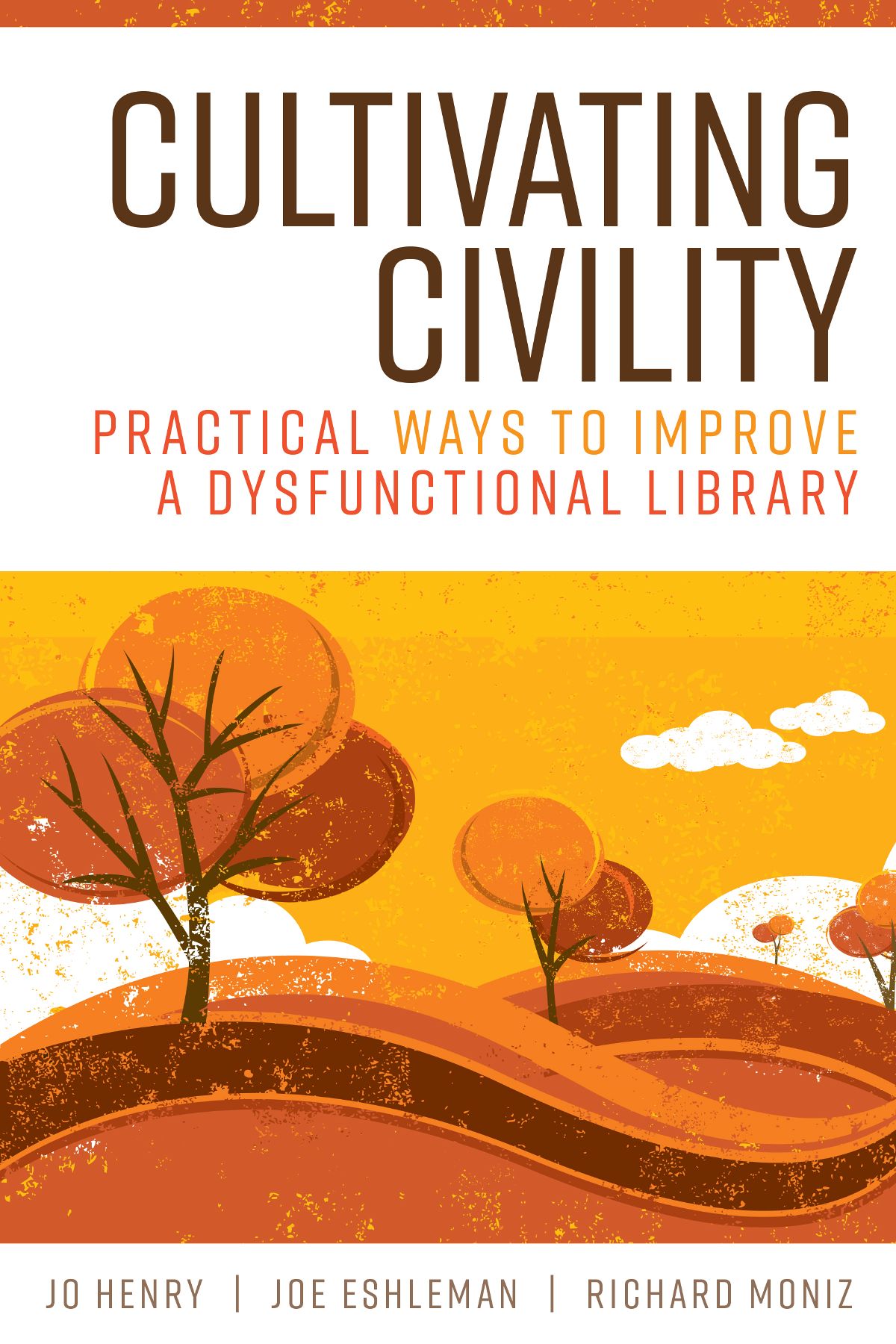
ALA Editions purchases fund advocacy, awareness, and accreditation programs for library professionals worldwide.
2020 by Jo Henry, Joe Eshleman, and Richard Moniz
Extensive effort has gone into ensuring the reliability of the information in this book; however, the publisher makes no warranty, express or implied, with respect to the material contained herein.
ISBNs
978-0-8389-4716-6 (paper)
978-0-8389-4724-1 (PDF)
978-0-8389-4723-4 (ePub)
978-0-8389-4725-8 (Kindle)
Library of Congress Control Number: 2019954457
Cover design by Alejandra Diaz; image retrostar, Adobe Stock.
Dedicated to all who are dealing with challenges in the library workplace and looking for solutions.
CONTENTS
We would like to thank the ALA Editions | ALA Neal Schuman editorial board for their overwhelming support of our book. We especially want to say a huge thank you to our editor Jamie Santoro for all her guidance and assistance with this project. As with our other books, she has provided invaluable feedback and counsel throughout the process. We would also like to thank all of the other members of the ALA Editions | ALA Neal Schuman team who work behind the scenes with great success. Thank you also to Rob Christopher, marketing coordinator, and his staff. Additionally, we would like to recognize Angela Gwizdala, director of editorial, design, and production, and her editorial staff for seeing us through the final stages of the book.
As in all our writing projects, the support of spouses, family, and friends is invaluable. They too sacrifice as we take time away from them for research and writing. Without their continuous support, our work would not be possible.
When we wrote our original work, The Dysfunctional Library: Challenges and Solutions to Workplace Relationships (2018), we also completed a survey of over 4,100 library staff which indicated that incivility and dysfunction were prevalent in the field. Our hope was to shine some light on this topic and provide some ideas for solutions to those in need. After the books release, we were contacted to do workshops on the topic both in-person and online. These additional interactions with library staff and administrators also confirmed the pervasiveness of these workplace issues. Inevitably, at the end of our workshops attendees would ask the same questions: What do we do now? Can you provide more solutions? Whats next?
Writing a follow-up book was never in our plans, but we felt compelled to come together one more time in an attempt to answer these questions. While the first book provided some solutions, it was primarily focused on defining the different kinds and causes of library workplace dysfunction. This new book, Cultivating Civility: Practical Ways to Improve a Dysfunctional Library is just thata book of solutions. We cannot possibly provide a solution to every problem that exists in the library workplace, but we can provide additional information and stimulate thought and discussion towards that goal. Additionally, we wanted the book to be for everyone. As a result, we divided this book into four partsindividual, team, leader, and organizationfocusing solutions in each part on those respective viewpoints.
on individuals by focusing on wellness and self-care. Unless we make sure that we are as mentally and physically healthy as we can be, we will not be able to address the concerns and stressors in the workplace very effectively. This chapter provides some common approaches to improving ones lifestyle in this regard.
provide real-life examples from libraries that help to solve dysfunction hurdles.
Solutions for functional leaders are provided in , how to manage staff members resistance to change is considered. A lament heard over and over again in dysfunctional libraries is that staff do not feel part of a unified team and they feel as though their work serves no purpose. In this chapter, library leadership is called to engage employees in a change process which may help to alleviate this morale-buster.
The . Among the solutions in this regard are forming a balanced psychological contract with employees, as well as promoting opportunities for employee engagement and growth. The organization part of this book concludes with a look at various types of training that can be used to minimize dysfunction. These include training for bias, empathy, conflict management, and diversity.
While many readers will find every chapter of this book useful, the design allows for targeted reading as well. The solutions (in ) for a more functional self may benefit all readers. Other parts provide solution perspectives depending on ones position and function in the library organization. We hope that there are benefits for everyone in this book. So let the page turn and the exploration of solutions for library dysfunction begin!
The Functional Individual
Understand Yourself First
W ithout self-awareness one will be doomed to failure from the start when addressing workplace problems. Self-awareness, therefore, is the crucial starting point for all of the content in this book. Without understanding ourselves and how we are perceived by others, we will be trying to solve problems in the dark, especially those that involve interpersonal relationships. Self-awareness is not only critical for library managers but for anyone working in a library setting. In the words of one scholar speaking on civility, I now see that bad behavior reflects a lack of self-awareness. We dont want to hurt others but we do. It is important to note that, while difficult, self-awareness can be improved. Put simply, increasing our self-awareness has wide-ranging benefits.
General Self-Awareness
The modern concept of self-awareness, especially as it applies to the library workplace, is the ability to know what ones own goals, values, and behaviors are and then also be able to see oneself from an outsiders or coworkers perspective. It is important to note that while self-awareness is of critical importance, possessing it alone does not mean that an individual is effective. By way of example, someone could see themselves as manipulative and controlling while others see them that way too. Thus, this individual could theoretically be self-aware and still not be a great person to work with. These people are labeled as aware dont care, and it is often impossible to change their approach. Often, these individuals believe they are better than others, and they also genuinely believe that leading through intimidation is a logical way to lead and manage.
Those who lack self-awareness, Tasha Eurich states, wont listen to, or accept, critical feedback. They cannot empathize with, or take the perspective of, others. They have difficulty reading a room and tailoring their message to their audience. They possess an inflated opinion of their contributions and performance. They are hurtful to others without realizing it. They take credit for successes and blame others for failures. It is hard to imagine anyone wanting to work in a library where employees are described this way. And yet, there may be someone in the library workplace who fits this description in part or whole. Often, our behavior falls on a spectrum. On some days and in some situations, individuals may be more self-aware than in others. Also, while the very point of self-awareness on a deeper level is understanding ones underlying emotions and motivations, when one is upset, angry, or stressed it can be much more challenging to maintain a sense of self-awareness. There are ways, however, that individuals can improve their ability to handle difficult situations while maintaining self-awareness.
Next page
